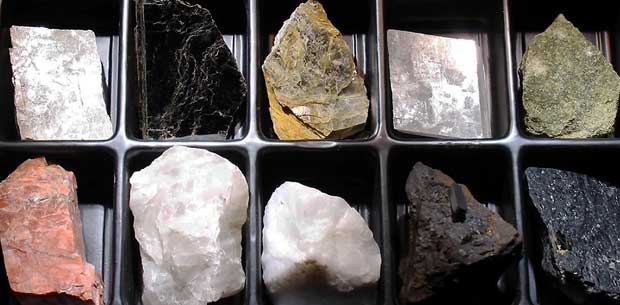
A mineral is a naturally occurring substance, representable by a chemical formula, that is usually solid and inorganic, and has a crystal structure. Rock are different than minerals since rock doesn’t have a specific chemical composition and can be aggregate of both minerals or non-minerals. However, many of the rocks are primarily made up of minerals after the decomposition and consolidation along with other organic or inorganic substances. Some of the common rock forming minerals along with their physical and chemical properties are discussed below:
1. Quartz
- It is pure or nearly pure silica and is hard and glassy mineral.
- It is transparent to translucent in nature and its colour varies from white and grey to smokey.
- It does not have a cleavage and thus does not break into regular flat faces.
- Hardness = 7, Specific gravity = 2.66
2. Feldspar
- Feldspar is silicates of alumina, with alkaline substances like potassium, sodium and calcium.
- Its appearance is not so glassy as that of Quartz and is dull to opaque with a porcelain-like appearance.
- A stone readily meets the decay if it contains large proportions of feldspar mixed with other minerals.
- Hardness = 6, Specific gravity = 2.5 to 2.7
3. Mica
- Mica contains silicates of aluminium with potassium.
- It is soft and readily affected by atmosphere and chemicals.
- It has perfect cleavage, causing it to easily break into thin sheets.
- Hardness = 2.5 and Specific gravity = 3.
4. Hornblende
- Complex silicate with hardness = 5.5 and specific gravity = 3.2.
- Dark coloured mineral found in many types of igneous and metamorphic rocks.
5. Calcite
- Leading constituent of limestone and marble.
- Hardness = 3 and specific gravity = 2.7.
6. Dolomite
- It is Magnesium carbonate with chemical composition as CaMg(CO3)2.
- Metamorphic rocks like dolomitic marble and few sedimentary rocks have dolomite as the major constituent.
- It has three directions of perfect cleavage.
- Moh’s hardness is 3.5 to 4, specific gravity is 2.8 to 2.9.
